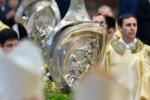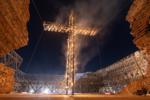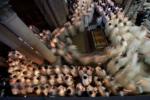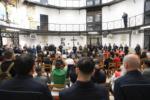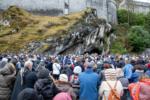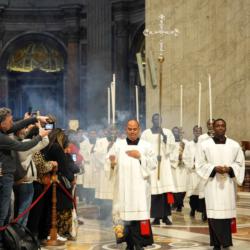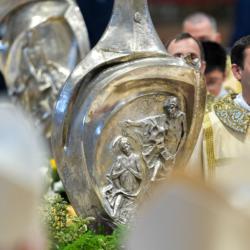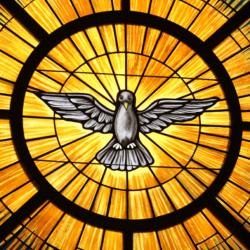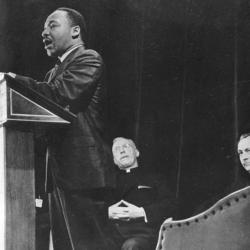The many faces of Mary that inspire devotion among Catholics of all cultures
SEATTLE (OSV News) -- Apparitions, images of the Blessed Mother inspire devotions in our cultural communities. Honoring the Virgin Mary and seeking her intercession is an important part of being Catholic.
"To celebrate Mary is to celebrate the closeness and tenderness of God who is with his people, who does not leave us alone, who has given us a Mother who cares for us and accompanies us," Pope Francis said in October 2023.
Catholics honor Mary in many ways and under many names. Most Catholics know about the apparitions of Our Lady of Lourdes in France, Our Lady of Fatima in Portugal and Our Lady of Guadalupe in Mexico. But did you know there are Vatican-approved Marian apparitions in Africa that occurred in the 1980s? Other apparitions of the Virgin Mary, reported centuries ago in China, India and Vietnam, continue to draw the devotion of Catholics here and abroad.
With the help of the Seattle Archdiocese's Multicultural Ministries team, the Northwest Catholic magazine reached out to the archdiocese's diverse Catholic communities, asking them to share their special devotions to Mary. Read about some of them here:
-- Our Lady of Kibeho: Feast Nov. 28 --
Our Lady of Kibeho appeared to three high school students in Kibeho, Rwanda, between 1981 and 1989.
On Nov. 28, 1981, Alphonsine Mumureke reported seeing a lady of incomparable beauty who called herself "Nyina wa Jambo" ("Mother of the Word"). In 1982 and 1983, two other young women, Nathalie Mukamazimpaka and Marie Claire Mukangango, also experienced public apparitions of Mary.
During a vision on Aug. 15, 1982, Alphonsine described a disturbing scene of killings, believed to be a prophecy of the Rwandan genocide in the 1990s that claimed more than 800,000 lives, including some 12,000 in Kibeho.
Our Lady of Kibeho's messages to the world included an urgent appeal for repentance and conversion, the need for suffering to attain heaven and requests for praying the rosary and renewing devotion to the Rosary of the Seven Sorrows of the Virgin Mary.
Mary's apparitions to Alphonsine ended exactly eight years after they began. They were approved by the Vatican in 2001 and are the only approved Marian apparitions in Africa. An estimated 100,000 pilgrims visit Kibeho each year.
-- Our Lady Of Peace & Good Voyage (Our Lady Of Antipolo): Feast Dec. 8 --
This 17th-century Roman Catholic wooden statue enshrined in Antipolo Cathedral is one of the most celebrated images of Mary in the Philippines. A form of the Black Madonna, the image represents Mary, the Immaculate Conception.
The statue was brought from Mexico in 1626. The ship's safe passage was attributed to the statue, so it was given the title "Our Lady of Peace and Good Voyage." The statue also traveled aboard galleons during six Pacific crossings from 1648 to 1748 and is credited with their safe passage.
During construction of a church to house the statue, tradition says the image would vanish from its shrine, only to reappear atop a tipolo tree. That was considered a divine omen, and the church was relocated to the site of the tree. When the Japanese invaded Antipolo during World War II, the statue was moved several times and even buried in a barrel to keep it safe until the war ended and it could be returned to the church in Antipolo. Today, millions of pilgrims visit the shrine annually.
-- Our Lady Of La Vang: Feast Nov. 22 --
During the persecution of Catholics in Vietnam in 1798, refugees hid in the jungle of La Vang in the Quang Tri Province. According to tradition, while praying the rosary one night, they had a vision of a woman wearing traditional Vietnamese garments and holding a baby. The woman consoled them, told them how to use the leaves of the trees to treat their ailments and told them, "From this day on, prayers said on this spot will be heard -- and answered."
They believed the apparition to be the Virgin Mary, and the story spread. A chapel was built on the site in 1820, followed by larger churches built to accommodate the growing number of pilgrims. La Vang became a minor basilica in 1961.
Although the apparition is not approved by the Vatican, in 1996 St. John Paul II commended Vietnam to the protection of Our Lady of La Vang. She represents hope, faith and promise to Vietnamese Catholics around the world.
-- Our Lady of Velankanni: Feast Sept. 8 --
In the 16th century, Marian apparitions were reported at two sites near the village of Velankanni (Way-laan-kanni), India. In each case, Mary, holding the infant Jesus, asked a boy carrying milk or buttermilk if he would give some for her son, and each boy complied.
When the first boy delivered the rest of the milk to his customer, the pot was still full. In the second apparition, Mary asked a disabled boy to find a specific man in the next town and deliver her request that he build a chapel on the apparition site. The boy's leg was healed; he relayed the message, and the man erected a small chapel. A body of water at the site is believed to provide healing.
In the 17th century, Portuguese sailors caught in a storm arrived safely ashore at Velankanni on the feast of Mary's birth. Grateful for their rescue, they turned the chapel into a stone church, a place to venerate Our Lady of Velankanni, also known as Mother of Good Health. Today, hundreds of thousands of pilgrims visit the minor basilica.
-- Our Lady Of Guadalupe: Feast Dec. 12
One of the most well-known Marian apparitions occurred in 1531 on Tepeyac Hill near Mexico City.
The Virgin Mary appeared on Dec. 9 to Juan Diego, an indigenous man who converted to Christianity. She directed him to ask the local bishop to build a chapel in her name on the site.
The bishop didn't believe Juan Diego at first. After two more apparitions and visits to the bishop, the bishop requested a sign. On Dec. 12, Mary appeared again to Juan Diego, directing him to gather flowers from the hill, then arranged them in his tilma, or cloak.
Juan Diego returned to the bishop. When he opened his tilma, the flowers fell to the floor, revealing the Virgin's image on the cloak. This miraculous image is enshrined in the Basilica of Our Lady of Guadalupe in Mexico City, visited by more than 10 million pilgrims each year.
-- Our Mother Of Africa: Feast Aug. 30 (US) --
Our Mother of Africa, also known as Our Lady of Africa, is a Marian image that holds special importance for members of the archdiocese's Black Catholic Advisory Circle.
A chapel honoring Our Mother of Africa was dedicated Aug. 30, 1997, at the Basilica of the National Shrine of the Immaculate Conception in Washington, D.C. The chapel features a bronze statue of Mary with African features.
A gift from the National Black Catholic Congress, the chapel "stands in remembrance of the painful history of slavery in the United States and the pillar of hope which Our Lady represented to enslaved peoples," according to the basilica website.
The devotion to Our Lady of Africa began when a statue of Mary as a Black woman was enshrined at Notre-Dame d'Afrique basilica in Algiers, Algeria, in the 1800s.
In Africa, Our Lady of Africa's feast day is April 30. In the U.S., the feast of Our Mother of Africa is celebrated Aug. 30, the anniversary of the basilica chapel's dedication.
-- Our Lady Of Czestochowa: Feast Aug. 26 --
Legend says the icon of Our Lady of Czestochowa was painted by St. Luke the Evangelist and taken to Constantinople in the fourth century. It's known the image was brought from Hungary in 1382 and left in the care of the Monastery of Jasna Góra, Poland, where it remains enshrined.
In 1430, the icon was vandalized; despite restoration work, two scars from a sword remain visible on the Madonna's right cheek.
No Marian apparitions have occurred at Jasna Góra, but the icon became famous for miracles attributed to Mary's intercession, including some connected to important events in Polish history. Pilgrims leave items at the shrine in thanksgiving. St. Pope John Paul II left the belt of his cassock that was shot through and bloodstained during the attempt on his life in 1981.
The icon is also called the Black Madonna. Some attribute its dark appearance to centuries of soot deposits from candles and incense.
In the U.S., the National Shrine of Our Lady of Czestochowa is in Doylestown, Pennsylvania.
-- Our Lady of China: Feast second Sunday of May --
According to legend, a woman in white appeared above the small town of Dong-Lu, China, while it was under attack in April 1900. Although soldiers shot toward the woman, the apparition didn't fade, and a strange horseman -- some say St. Michael -- caused the soldiers to flee.
The original painting of Our Lady of China shows Mary dressed in the royal robes of the pagan empress. This mosaic, depicting Mary and Jesus wearing traditional Chinese garments, is installed at the Basilica of the National Shrine of the Immaculate Conception in Washington.
The mosaic is a copy of a well-known painting of Our Lady of China that was used on a holy card by Thomas Cardinal Tien Ken-Sin, China's first cardinal. After his exile, the cardinal used the holy card to promote devotion to Mary and prayers for the persecuted church in China.
Chinese Americans in the United States pioneered and contributed to the mosaic project to show gratitude to Mary's maternal intercession for the people of China.
- - - Jean Parietti is features editor for Northwest Catholic, the publication of the Archdiocese of Seattle.- - - NOTES: The April/May issue of the Seattle Archdiocese's Northwest Catholic magazine has even more apparitions and images of the Virgin Mary that inspire devotion among Catholics. The issue can be found at NWCatholic.org/Mary.

